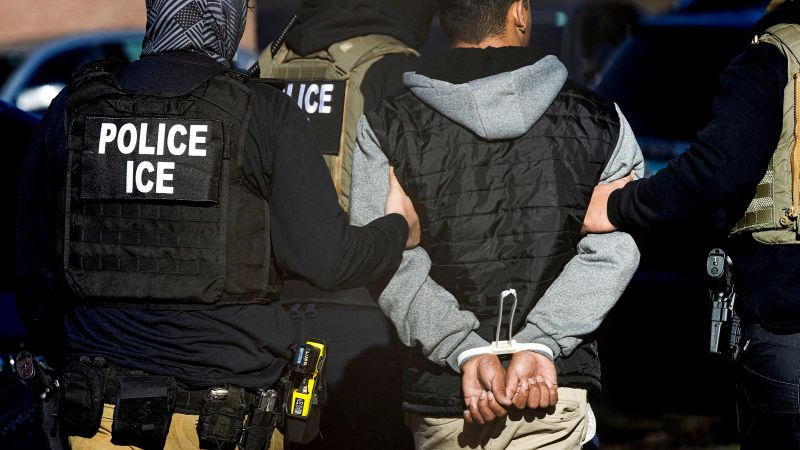A version of this story appeared in CNN’s What Matters newsletter. To get it in your inbox, sign up for free here.
CNN
—
The American immigration drama offers a unique Rorschach test for the moment.
Do you find the deployment of troops to Los Angeles menacing or comforting?
When you see video of a US senator, Democrat Alex Padilla of California, being forcibly removed from a Department of Homeland Security Secretary Kristi Noem’s press event, do you wonder what was he thinking or her people were thinking?
When you see employees in front of a meatpacking plant in Nebraska trying to block vehicles with masked federal agents driving off with scores of their coworkers, do you question President Donald Trump’s dogged push for mass deportation or applaud it?
Are you more concerned about ICE raids targeting people who are trying to find work in front of Home Depot stores or who are employed in the garment district — or the protests those raids sparked?
When you see Vice President JD Vance posting memes making light of deporting people, do you find it funny or repulsive?
When you read that the most-followed person on TikTok, a Senegalese Italian comedian named Khaby Lame who has more than 162 million followers, may have been forced to leave the country a few weeks after attending the Met Gala, do you wonder how that’s at all helpful or say good riddance?
Do you wonder why the government is charging the respected Los Angeles labor leader David Huerta after he was arrested in Los Angeles protests, or wonder why it wouldn’t?
There’s no question what Trump sees. Rather than seeing a response to ICE raids, he sees professional agitators. Trump has repeatedly said this week, while inflating the danger posed by protests, that protesters themselves are “insurrectionists” and paid professionals.
He’s ready to respond across the country.
“When it comes to Los Angeles — or other cities, if we see other cities are gearing up — and these people are agitators,” Trump said Thursday at the White House. “They’re paid. They’re professionals. They’re insurrectionists. They’re troublemakers. They’re all of those things. But I believe they’re paid, and we’re going to find out.”
There’s no evidence to support the idea of a union of paid protesters, as CNN’s Aaron Blake explained. But that hasn’t stopped Trump from dispatching Attorney General Pam Bondi to investigate.
In pictures: Protests in LA after immigration raids
If all this sounds familiar, the idea that protesters who oppose Trump are not real protesters has been a theme of his presidencies. Most recently, Elon Musk argued that it was paid protesters picketing outside Tesla dealerships earlier this year. Most of those events were peaceful, but there were instances of destruction, which should clearly be prosecuted along with any looting in Los Angeles.
How Americans ultimately view the ramping up of ICE raids and the resulting protests will have a lot to do with how Trump’s second presidency proceeds.
Will they endorse the arrest of migrants in places like church parking lots and outside schools? And will they approve of the deportation of undocumented people who have been living and working in the US without committing crimes other than the civil offense of their arrival?
For now, the public is split over Trump’s choice to send the National Guard and Marines to respond to the protests in Los Angeles, according to a new one-day survey from the Washington Post and George Mason University’s Schar School conducted on Tuesday.
Forty-four percent oppose Trump’s choice to send in the National Guard and Marines, while 41% support it and 15% say they are unsure how they feel about it, although CNN’s Director of Polling Jennifer Agiesta noted that one-day polls can be subject to larger errors than those conducted over a number of days.
One of the poll’s noteworthy findings is that political independents break more toward opposition — 48% oppose Trump’s actions, compared with 33% who support them and 19% who are unsure.
A lot of people are also still making up their minds about the protests themselves. About one-fifth, 21%, said they are unsure if they support or oppose them.
Americans aren’t yet sure what to make of this.

